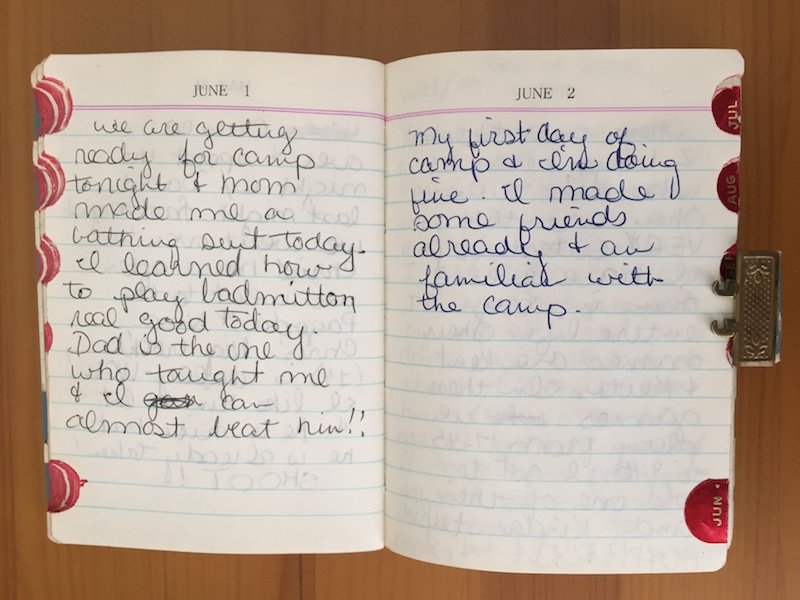Change a Life: Give a Young Person a Diary
In these days of computers and phones, writing by hand evokes nostalgia. I hear people say, “I’m trying to do everything digitally these days,” as they strive for efficiency and data-protection. But even in the midst of information overwhelm, the physical act of writing by hand on actual paper, in private, remains a powerful tool for personal alignment.
I’m here to raise a fist (clutching a pen) in support of journaling by hand. In particular, I’m here to champion the locked diary as a gateway for preteens and teens to discover the life-changing practice of self-recognition via their own handwritten words.
Around the time I turned thirteen, a family friend gave me a locking one-year diary. The lock and key inspired trust enough that I dared to share my private thoughts. The lock would have been easy for someone else to pick. The concept of privacy mattered more than the reality of it.
Nothing earth-shattering went down on the diary's pages, except that I began to learn how to share my truth with myself.
Here's an example of an entry:
June 1 – "We are getting ready for camp tonight and mom made me a bathing suit today. I learned how to play badmitton real good today. Dad is the one who taught me & I can almost beat him!"
June 2 – "My first day of camp & I’m doing fine. I made some friends already & am familiar with the camp."
That was me: Little Reporter Girl, intent on faithful capture of a summary, with bare bones highlights.
Not every day prompted blunt reportage. Some entries, like the one in the photo below (my first name was Melinda back then), chronicled special events with extra verve (if my robotic statement, I had a good time, devoid of an exclamation point, counts as verve):
May 22 – "Theresa invited me to a concert (Gloria Gaynor) & I went at 8:00 pm. We got home at 12:30. I got 2 autographs. They are on this page, along with a penny that one of the guys out of her band dropped & I got. She is the one that sings ‘Never Can Say Good-by.’ I had a good time."
Gloria Gaynor, people! (I must provide a belated exclamation point.) I remember the venue for that concert. The small room with a low ceiling and folding chairs reminded me of a church function room.
Every time I added my experience of a day to the diary, I made a decision about what to write about. Each experience I chronicled thus expanded and amplified. I learned, in this seemingly small way, to exert a measure of control over how I viewed my days. And I steadily got more hooked.
After I finished that diary, I wrote more. And then more. Over decades, I’ve clawed and hugged my way through hardcover blank books and hundreds of spiral notebooks, filling them with pain, wonder, anger, joy, revelation, understanding, acceptance, creativity, stories, and thought experiments. They added up to a practice of tuning in, seeking the real, and noticing my own self, even when—especially when—no one else seemed to.
Journaling taught me to choose myself.
Thanks to that family friend (my dad’s wonderful secretary), who thought to give me my first diary, I grew up to write first for myself, and to embrace a career of writing to share about topics and truths I consider important. Writing is my way of spreading love.
The simplest events can spark long-lasting positive effects. There is something sacred in giving the gift of space to tell a secret. If you know a preteen or a teenager, consider gifting them a locking diary on their next birthday. Who knows what you might spark.
There’s a young person in you too. You can pick up a spiral notebook at the grocery store next time you’re there. Or run your fingers over the spines of the blank books in a bookstore and choose one that opens for you, eager to receive.
Take a chance on yourself. You, holding and moving a pen, your breath a rebound on the page, animates something genuine, the pulse at the center. Dive in, dive deeper. Feel, and write about it. There is plenty of room on the page, enough space for fear and tears and hope.
As you tune in, be gentle with your vulnerable, private self.
===
Alice Archer is the author of the literary romance novels Everyday History and The Infinite Onion. You can subscribe to her newsletter to receive a free story, notification of new articles and books, and more.
Read more articles about: Memoir


